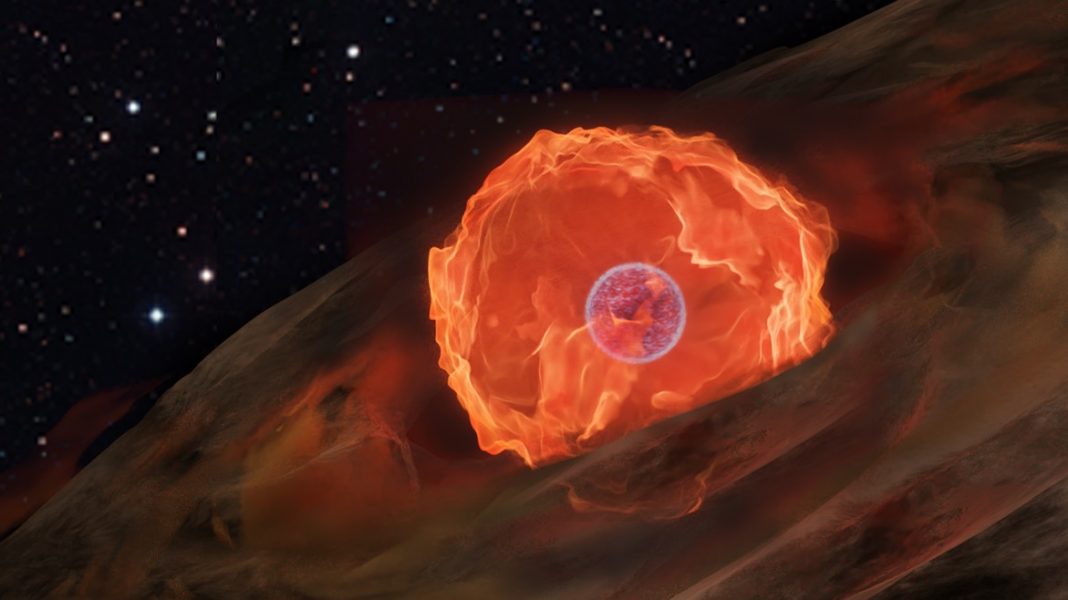Blink and you’ll miss it — a searing explosion of X-rays 60 times hotter than the surface of the sun. That’s what astronomers have observed on a distant white dwarf star for the first time ever. In July 2020, a group of scientists from European universities were scanning the skies with the German eROSITA X-ray telescope , an instrument that specializes in soft X-rays and orbits a gravitationally stable point in space about 930,000 miles (1.5 million kilometers) from Earth. The researchers happened to catch an extraordinarily bright explosion, which they have identified as a white dwarf explosion called a nova. White dwarfs are extremely dense stars that have consumed the majority of their gas. In some cases, excess hydrogen collects on the surface of a white dwarf, usually due to the white dwarf “stealing” material from a nearby star — that accretion can explode in a violent, energetic release called a nova . And that’s precisely what the team observed in July 2020. “It was to some extent a fortunate coincidence, really,” Ole König, a Ph.D. student specializing in X-ray astronomy at the Astronomical Institute at FAU in Germany and a co-author on a paper about the observations, said in a statement . “These X-ray flashes last only a few hours and are almost impossible to predict, but the observational instrument must be pointed directly at the explosion at exactly the right time.” Related : German X-ray telescope takes first images of universe. Here they are! Even more impressively, the team observed the nova in the spectrum of soft X-rays. White dwarf novas often emit energy in this range before the rays weaken to become visible light, which eventually reaches Earth . “Soft X-rays are not very energetic and easily absorbed by interstellar medium, so we cannot see very far in this band, which limits the number of observable objects, be it a nova or ordinary star,” Victor Doroshenko, an astrophysicist at Tübingen University in Germany and another co-author of the study, said in the same statement. “Telescopes are normally designed to be most effective in harder X-rays, where absorption is less important, and that’s exactly the reason why they would miss an event like this!” The nova was so strong that the resulting image from the eROSITA X-ray telescope was completely overexposed, since the instrument was calibrated to observe much subtler X-rays. But the team was able to compensate for that exposure. “Using the model calculations we originally drew up while supporting the development of the X-ray instrument, we were able to analyze the overexposed image in more detail during a complex process to gain a behind the scenes view of an explosion of a white dwarf, or nova,” FAU astrophysicist Jörn Wilms and study co-author said in the statement. — ‘Cow’ supernova is brightest ever seen in X-ray observations — Giant ghostly ‘hand’ stretches through space in new X-ray views — Violent stellar explosion produces highest-energy gamma-rays ever observed from a nova The team determined the white dwarf is relatively large, with a mass similar to that of the sun. The explosion reached a temperature of around 327,000 degrees Kelvin, or about 60 times hotter than the sun . The new research comes from 2020 observations, but for now eROSITA’s science work is on hold. The telescope began work in 2019 and, along with a Russian instrument, is mounted on a Russian spacecraft. Germany turned the telescope off early this spring in response to Russia’s invasion of Ukraine. The team’s observations were published in the journal Nature on May 11. Follow Stefanie Waldek on Twitter @StefanieWaldek . Follow us on Twitter @Spacedotcom and on Facebook .
Top Trending
Friday, June 20, 2025



